Dates are naturally sweet fruits rich in fiber, minerals, and antioxidants that may support heart, digestive, and brain health.
Grown from the date palm (Phoenix dactylifera), they’ve been a staple of Middle Eastern diets for thousands of years. Modern research confirms that dates provide essential nutrients and bioactive compounds that promote energy, metabolic balance, and overall wellness.
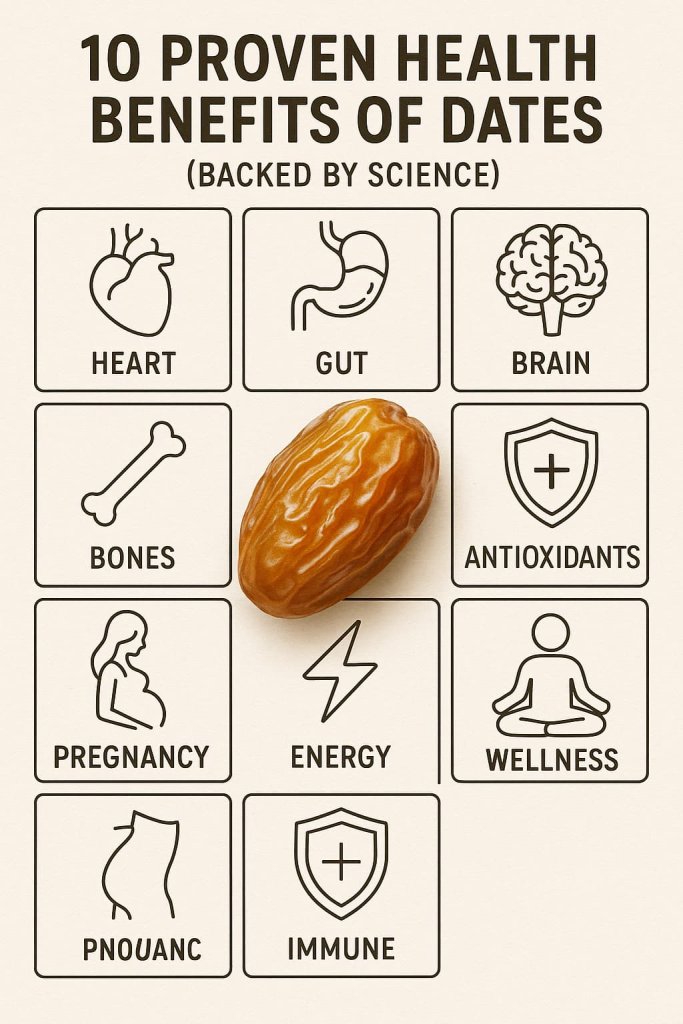
Understanding how dates contribute to your diet helps you make mindful, science-based food choices — whether you enjoy them fresh, dried, or blended into smoothies and desserts.
What Are Dates? (Overview and Nutrition Profile)
Dates are the naturally sweet, chewy fruits of the date palm tree (Phoenix dactylifera), one of the oldest cultivated fruit crops in the world. Native to the Middle East and North Africa, dates have been a vital source of energy, fiber, and minerals for thousands of years — often referred to as “nature’s candy” due to their naturally rich taste and nutrient density.
There are over 200 varieties of dates, but the most popular and commercially available types include:
- Medjool: Large, soft, and caramel-like flavor; rich in potassium and magnesium.
- Deglet Noor: Firmer texture with a delicate sweetness; commonly used in cooking and baking.
- Ajwa: Dark, soft, and less sweet; traditionally prized for its antioxidant content.
- Barhi and Zahidi: Smaller, golden varieties with a chewy texture and mild taste.
Dates can be enjoyed fresh or dried, though dried dates are more common and have a longer shelf life. While they are naturally high in sugars, they also deliver important vitamins, minerals, and dietary fiber that support digestive, heart, and metabolic health.
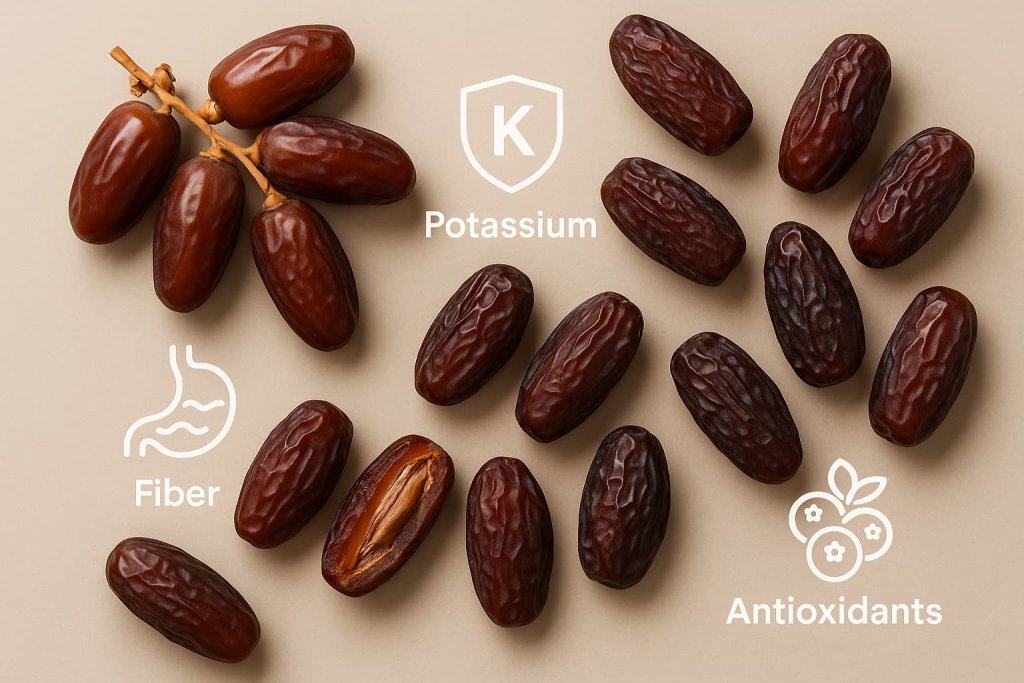
Nutritional Profile of Dates (Per 100 g, USDA FoodData Central, 2024)
| Nutrient | Amount | % Daily Value (approx.) |
|---|---|---|
| Calories | 277 kcal | — |
| Carbohydrates | 75 g | — |
| Dietary Fiber | 7 g | 25% |
| Sugars (Natural) | 66 g | — |
| Protein | 2 g | 4% |
| Fat | 0.2 g | — |
| Potassium | 696 mg | 15% |
| Magnesium | 54 mg | 13% |
| Copper | 0.4 mg | 18% |
| Manganese | 0.3 mg | 13% |
| Iron | 0.9 mg | 5% |
| Vitamin B6 | 0.2 mg | 10% |
Source: USDA FoodData Central – Dates, Medjool
10 Proven Health Benefits of Dates (Backed by Science)
Modern nutrition science confirms that dates are much more than a natural sweetener — they’re packed with fiber, minerals, and antioxidants that support multiple aspects of overall wellness. Below are ten evidence-based health benefits, each supported by current research and authoritative medical sources.
1. Supports Digestive Health
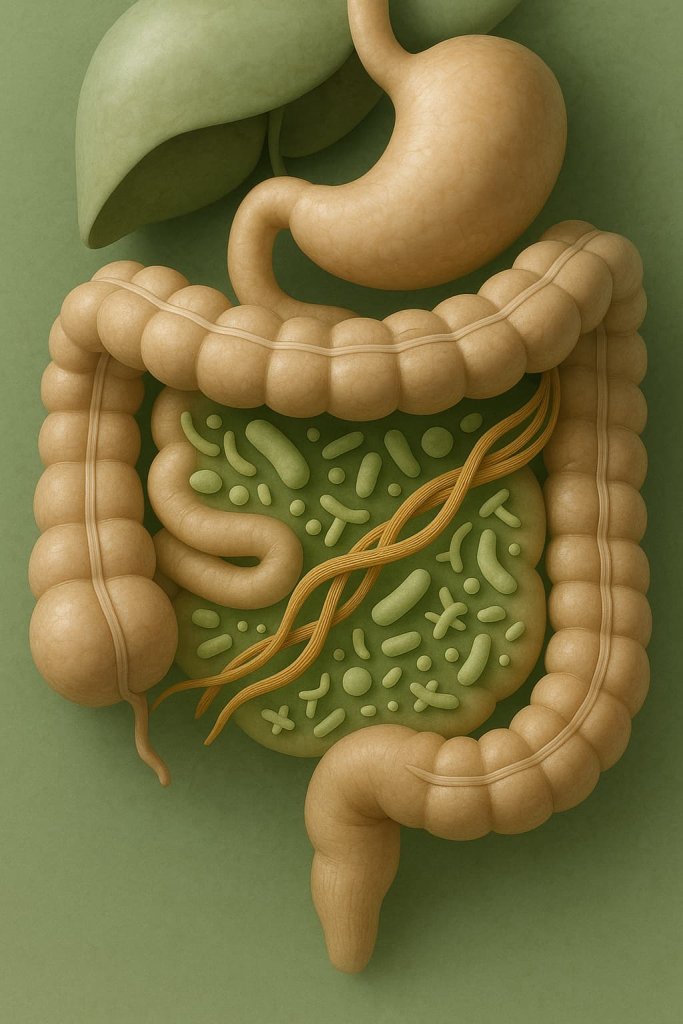
Dates are an excellent source of dietary fiber, which plays a crucial role in maintaining digestive balance and bowel regularity. A 2015 study published in the British Journal of Nutrition found that participants who ate seven dates per day for three weeks experienced significantly improved stool frequency and easier digestion compared with the control group.
Fiber in dates also supports beneficial gut bacteria, helping promote a healthy microbiome that enhances nutrient absorption and digestive comfort.
Reference: Healthline – Benefits of Dates | British Journal of Nutrition – Date Consumption and Bowel Health
2. Provides Antioxidant Protection

Dates are rich in flavonoids, phenolic acids, and carotenoids — powerful plant compounds known to help counter oxidative stress. These antioxidants neutralize free radicals that can damage cells, supporting long-term health and immune defense.
Research published in Nutrients (2021) and other peer-reviewed journals indicates that date extracts may enhance antioxidant enzyme activity such as catalase and superoxide dismutase (SOD). These protective effects may contribute to reduced cellular aging and overall metabolic balance.
Reference: PubMed Central – Nutritional and Health Promoting Potential of Dates
3. Supports Heart and Circulatory Health

Dates provide essential minerals like potassium and magnesium, which are critical for maintaining normal heart rhythm and blood pressure. Potassium helps regulate sodium levels, supporting vascular function and circulation.
According to the Cleveland Clinic, dates also contain antioxidants that may help protect arteries from oxidative damage. Preclinical studies suggest date polyphenols can promote healthy cholesterol levels and improve endothelial function — factors linked to cardiovascular well-being.
4. May Help Balance Blood Sugar Levels
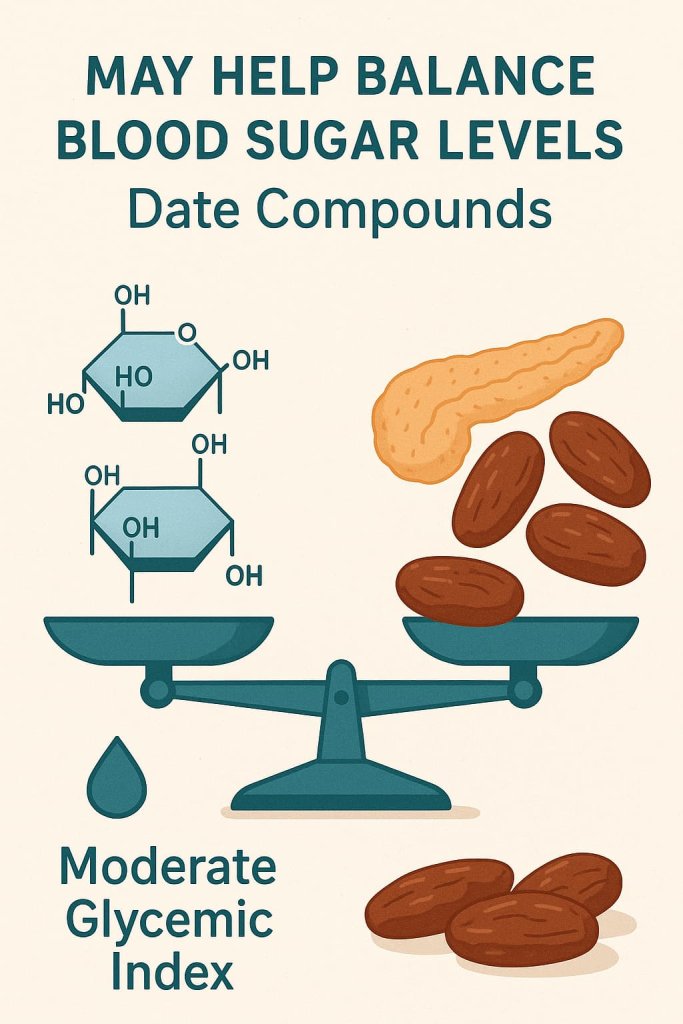
Despite being naturally sweet, dates have a moderate to low glycemic index (GI) — generally ranging between 42 and 55, depending on the variety — which means they raise blood sugar more gradually than refined carbohydrates. This makes them a smarter, fiber-rich alternative for those seeking to maintain balanced energy and glucose levels.
A review published in Nutrients (2022) found that date consumption did not worsen blood sugar or HbA1c levels in people with type 2 diabetes, suggesting that dates may be safely enjoyed in moderate portions when part of a balanced diet (MDPI – Nutrients Journal). Similarly, a human study in Nutrition Journal reported that certain date varieties exhibited low glycemic responses and may help maintain stable post-meal glucose levels (Nutrition Journal).
To further moderate blood sugar impact, pair dates with protein- or fat-containing foods such as nuts, seeds, or Greek yogurt — a strategy that slows carbohydrate absorption and supports metabolic balance.
Practical Tip:
- Limit intake to 1–2 medium dates per serving for better portion control.
- Choose varieties known for lower GI values, such as Ajwa or Medjool dates, which may offer slower glucose release (PubMed Central – Glycemic Index of Dates).
Reference: Medical News Today – Are Dates Good for People with Diabetes?
5. Promotes Brain Health and Cognitive Function

Dates contain natural antioxidants that may support brain health and cognitive resilience. In animal studies, date extracts helped reduce inflammatory markers such as interleukin-6 (IL-6) and beta-amyloid plaques — processes associated with neurodegenerative conditions.
While more human research is needed, these findings suggest that moderate date consumption may help maintain mental clarity, focus, and mood balance through improved antioxidant and anti-inflammatory pathways.
Reference: Healthline – Benefits of Dates for Brain Health
6. May Support a Healthy Pregnancy and Natural Labor
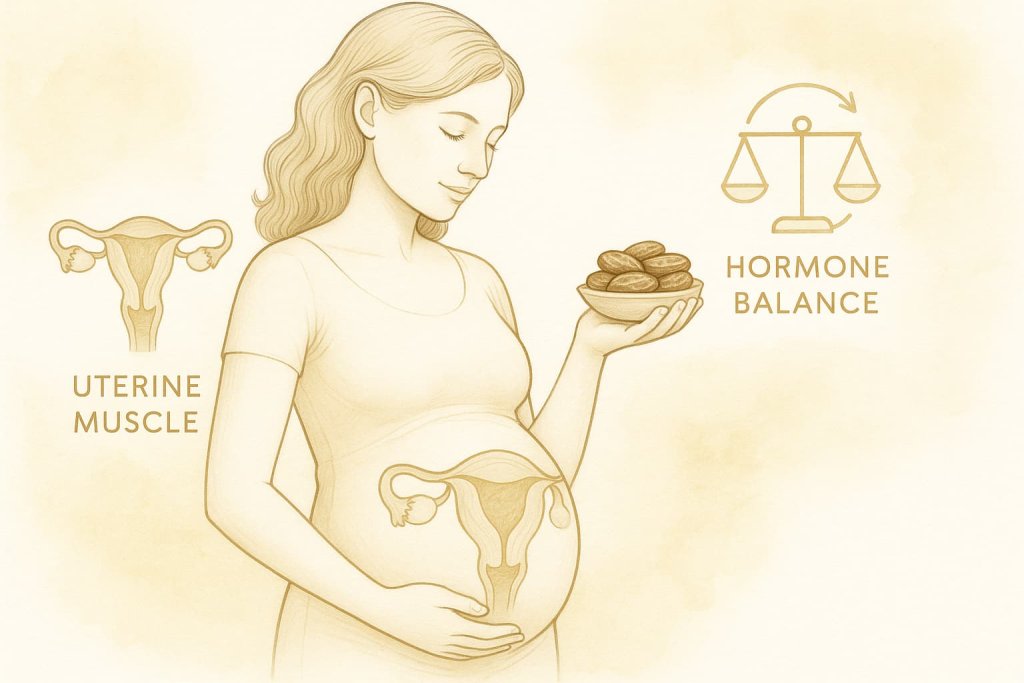
Dates are traditionally used to support women’s health during pregnancy — and research now provides scientific support for this practice.
A Journal of Obstetrics and Gynecology study (2017) found that women who ate six dates daily for four weeks before their due date experienced shorter early-labor stages and less need for medical induction compared with those who didn’t.
The natural sugars and compounds in dates may help stimulate uterine muscle tone and energy during labor.
Reference: PubMed – The Effect of Date Fruit on Labor Parameters
7. Provides Natural Energy and Nutrient Density

Dates deliver a quick, balanced energy boost thanks to their natural sugars (glucose, fructose, and sucrose) and vital minerals. They’re ideal as a pre- or post-workout snack that restores glycogen levels and supports hydration.
Unlike refined sugar, dates also provide fiber, magnesium, and potassium — nutrients that maintain electrolyte balance and sustained vitality. As noted by the Cleveland Clinic, choosing dates instead of processed sweets supports energy without the blood sugar spikes of added sugars.
8. Supports Bone and Mineral Health

Dates are rich in magnesium, manganese, copper, and potassium, minerals essential for maintaining strong bones and muscle coordination. These nutrients support enzymatic functions that influence bone density and skeletal strength.
While human trials are limited, mechanistic evidence shows that magnesium and manganese play a role in bone formation and calcium metabolism. Including dates as part of a varied diet can help contribute to overall mineral intake for bone maintenance.
Reference: News Medical – Health Benefits of Dates
9. May Support Weight Management
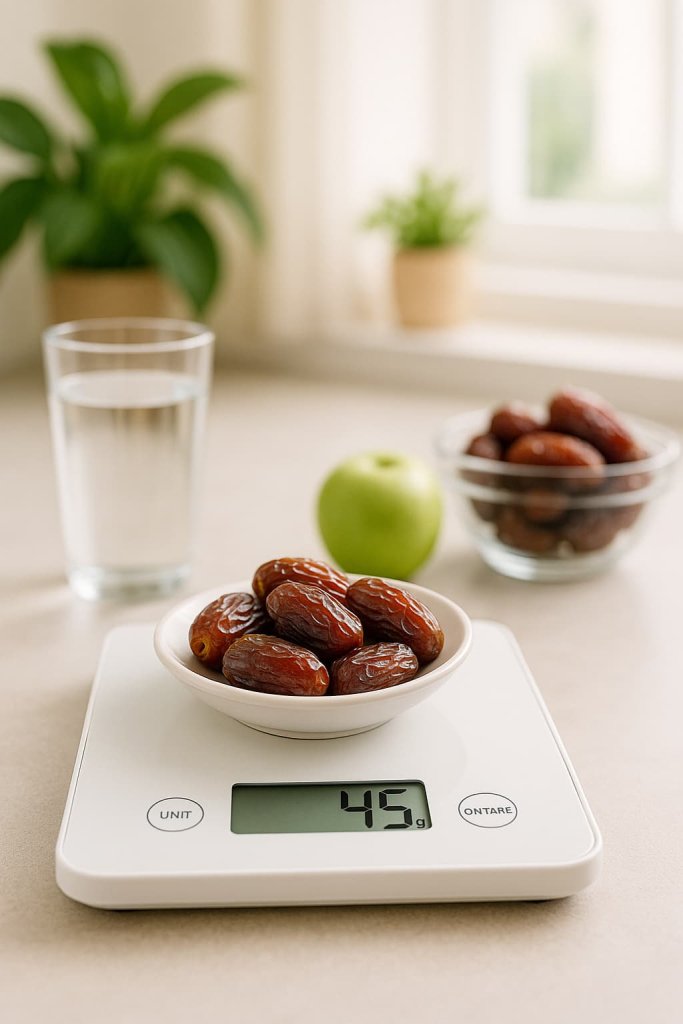
Though calorie-dense, dates provide fiber and natural sweetness, which promote satiety and reduce cravings for refined sugar. Fiber slows digestion, helping control appetite and maintain steady energy levels.
Replacing processed snacks with 2–4 dates daily can satisfy sweet cravings more healthfully while supporting mindful portion control. The Verywell Health review highlights dates as a nutritious alternative for those looking to maintain a balanced diet.
10. May Have Anti-Inflammatory and Protective Effects
Dates contain a complex mix of flavonoids and phenolic acids that have been shown to influence inflammatory and oxidative stress pathways. Laboratory studies published in Molecules (2021) indicate that these compounds may help modulate cellular responses, supporting long-term metabolic health.
While human evidence remains limited, including dates in a balanced diet provides antioxidants that may help protect the body’s tissues and cells from everyday oxidative challenges.
Reference: MDPI – Phytochemical Properties of Dates
Possible Side Effects and Precautions
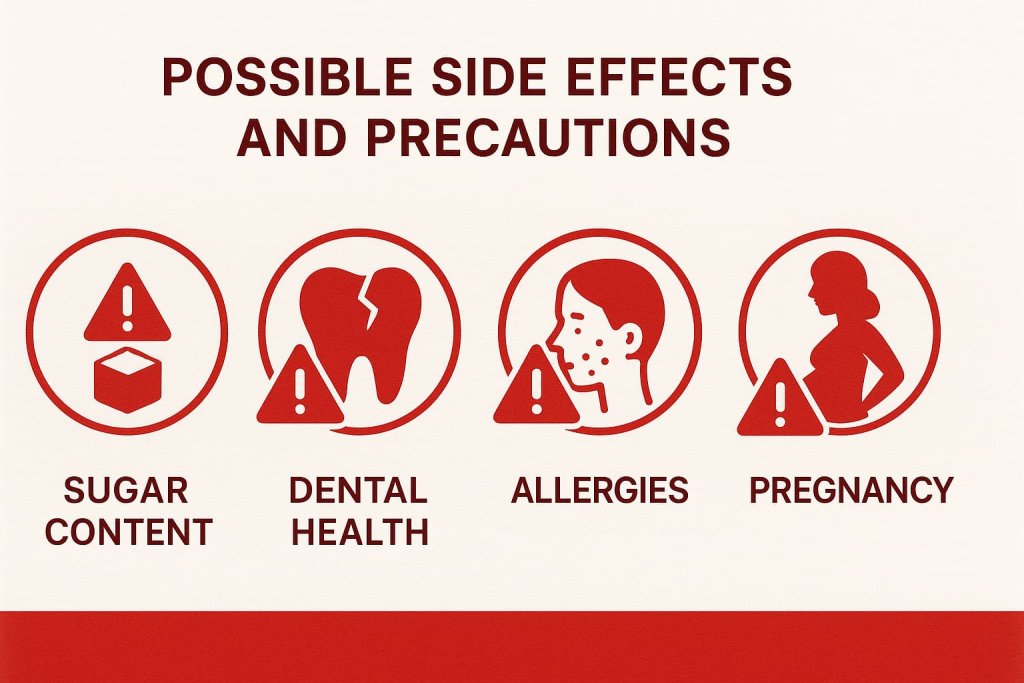
While dates are nutritious and safe for most people, moderation and awareness of individual health needs are essential.
1. High Natural Sugar and Calorie Content
Dates are calorie-dense and naturally rich in fructose and glucose. Overconsumption may raise total sugar intake and calorie load, especially for individuals managing blood sugar or weight. The Cleveland Clinic (2025) advises limiting portion sizes to maintain balanced energy without spiking glucose levels (Cleveland Clinic – Benefits of Dates).
2. Allergy Considerations
Though rare, some people may experience allergic reactions to dates or sulfites used as preservatives in certain dried varieties. Symptoms may include itching, swelling, or respiratory discomfort. The Mayo Clinic recommends avoiding packaged dried fruits with sulfites if you have known sensitivities (Mayo Clinic – Food Allergies).
3. Dental Health
Dates’ naturally sticky texture can cling to tooth enamel, allowing sugars to stay on the surface longer and giving oral bacteria more time to produce acids that may weaken enamel. Over time, this can increase the risk of cavities if proper dental hygiene isn’t maintained.
The American Dental Association (ADA) explains that frequent exposure to sugary and sticky foods contributes to tooth decay because bacteria feed on these sugars, producing acids that erode enamel (ADA – Nutrition and Oral Health). Similarly, the Mayo Clinic advises brushing at least twice daily, flossing, and rinsing after meals to remove food particles and reduce acid buildup (Mayo Clinic – Dental Health).
4. Pregnancy and Lactation
Dates are generally safe during pregnancy and may support natural labor in late stages, but excessive consumption may cause digestive discomfort due to their fiber and sugar content. Pregnant individuals should consult their healthcare provider for personalized guidance (PubMed – The Effect of Date Fruit on Labor Parameters).
Key Takeaway: Enjoy dates in moderation, practice good oral hygiene, and seek professional advice if managing diabetes, pregnancy, or food sensitivities.
Recommended Daily Intake and Storage Tips
Daily Portion Guidance
Most healthy adults can safely enjoy 2–4 medium dates (about 40–50 g) per day as part of a balanced, nutrient-rich diet. This serving provides fiber, potassium, and natural sugars that support sustained energy without excessive calories.
For individuals managing blood sugar or weight, limiting intake to 1–2 dates per serving is recommended. Pairing dates with protein or healthy fats—such as almonds, walnuts, or Greek yogurt—can help slow sugar absorption and maintain stable energy levels throughout the day.
According to the Cleveland Clinic, portion control and mindful pairing are key to enjoying dates while maintaining balanced nutrition (Cleveland Clinic – Health Benefits of Dates).
Storage Guidelines (USDA & FDA Standards)
Proper storage ensures that dates remain safe, fresh, and flavorful while preventing bacterial growth or spoilage.
- Temperature: Keep dates at or below 40 °F (4 °C) as advised by the U.S. Food and Drug Administration (FDA) to reduce the risk of foodborne contamination (FDA – Are You Storing Food Safely?).
- Shelf Life:
- Fresh Dates: Store in the refrigerator and consume within 1–2 weeks.
- Dried Dates: Keep in an airtight container in a cool, dry place for up to 6 months; refrigerate for longer storage.
- Freezing: Safe for extended storage, though it may slightly change the texture.
- Avoid Moisture: Exposure to humidity can promote mold growth and reduce quality.
- Trusted Resource: The USDA FoodKeeper Database recommends refrigeration or freezing for longer shelf life and optimal food safety (USDA – Safe Food Storage).
How to Include Dates in a Healthy Diet
Dates are incredibly versatile and can enhance both sweet and savory dishes while supporting balanced nutrition.
Practical Ways to Enjoy Dates
- Breakfast Boost: Chop dates into oatmeal, overnight oats, or yogurt bowls for natural sweetness.
- Smoothie Add-In: Blend 1–2 pitted dates into fruit or protein smoothies instead of refined sugar.
- Energy Snacks: Pair dates with almonds or peanut butter for a fiber-protein combo that sustains energy.
- Salads and Bowls: Add sliced dates to salads with spinach, feta, or quinoa for flavor and mineral richness.
- Healthy Baking Substitute: Use date paste or pureed dates as a natural sweetener in muffins or granola bars.
Balanced Pairing Principle
To avoid rapid blood sugar spikes, always combine dates with fiber, protein, or healthy fats. This pairing slows digestion and enhances nutrient absorption — an approach recommended by the Harvard T.H. Chan School of Public Health for balanced meals (Harvard Health – Healthy Eating Plate).
Frequently Asked Questions (FAQs)
1. Can people with diabetes eat dates?
Yes — in moderation. Dates have a moderate glycemic index and, when limited to small portions (1–2 dates), can fit into a balanced diabetic diet. Always monitor blood sugar response.
2. Are fresh or dried dates better?
Both are nutritious. Fresh dates have more moisture and slightly fewer calories per gram, while dried dates are more concentrated in sugars and minerals.
3. Are dates safe during pregnancy?
Yes. Studies suggest eating dates in late pregnancy may support cervical readiness and reduce labor duration, but consult your obstetrician before increasing intake.
4. Do dates cause weight gain?
Not directly. Dates are calorie-dense, so portion control is important. When eaten mindfully, they may actually support satiety and help replace processed sweets.
5. What is the best time to eat dates?
They’re ideal as a mid-morning snack or pre-workout energy source, providing natural sugars and minerals for quick energy.
6. Can children eat dates?
Yes — in age-appropriate portions and always pitted. Dates can provide natural sweetness and fiber, making them a better choice than sugary treats.
Conclusion
Dates are a naturally nutrient-rich fruit that supports digestive health, provides lasting energy, and contributes to heart, brain, and metabolic wellness when eaten in moderation.
By pairing them with protein or healthy fats and following safe storage practices, you can enjoy dates as part of a well-balanced diet that aligns with modern nutritional science and food safety standards.
This content is for informational purposes only and not medical advice.
References:
- British Journal of Nutrition – Date Fruit Consumption Improves Bowel Function
Peer-reviewed human study showing how regular date consumption enhances digestive health and stool regularity. - Nutrition Journal – Glycemic Indices of Five Varieties of Dates
Research demonstrating that dates have a low to moderate glycemic index, supporting stable blood sugar levels when eaten in moderation.
